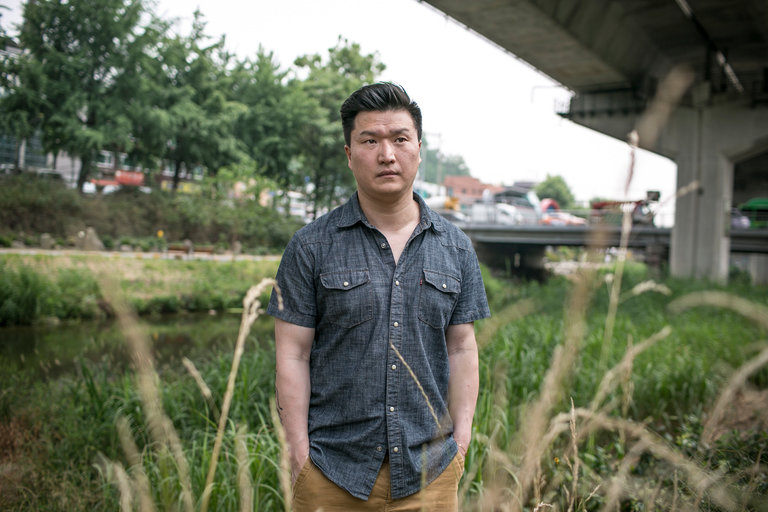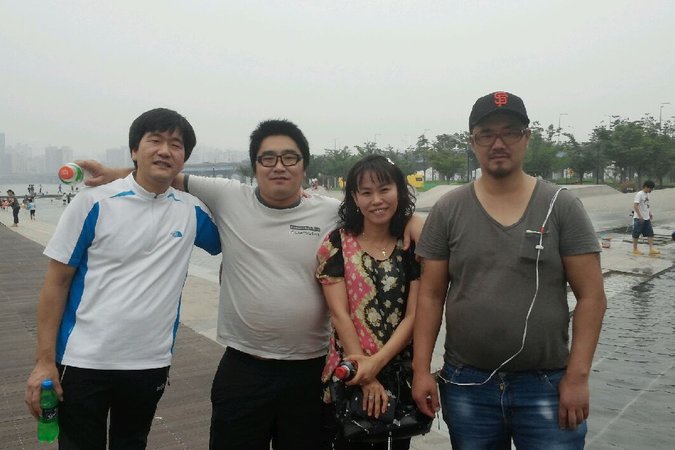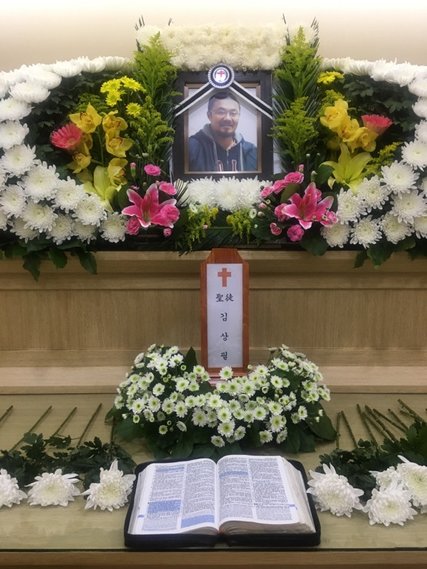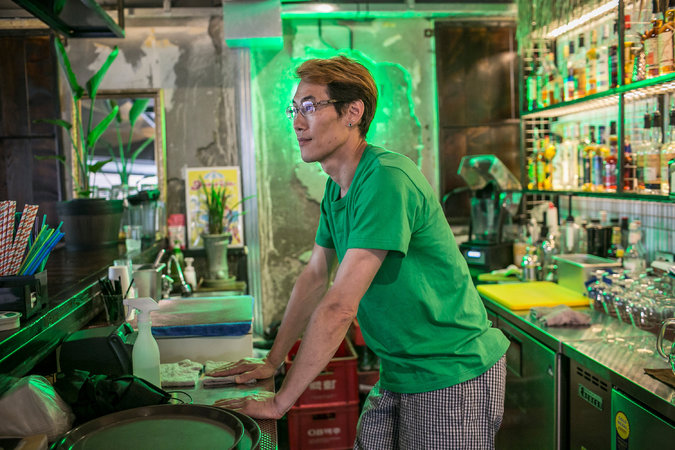- California Assembly OKs highest minimum wage in nation
- S. Korea unveils first graphic cigarette warnings
- US joins with South Korea, Japan in bid to deter North Korea
- LPGA golfer Chun In-gee finally back in action
- S. Korea won’t be top seed in final World Cup qualification round
- US men’s soccer misses 2nd straight Olympics
- US back on track in qualifying with 4-0 win over Guatemala
- High-intensity workout injuries spawn cottage industry
- CDC expands range of Zika mosquitoes into parts of Northeast
- Who knew? ‘The Walking Dead’ is helping families connect
Deportation a ‘Death Sentence’ to Adoptees After a Lifetime in the U.S.
https://www.nytimes.com/2017/07/02/world/asia/south-korea-adoptions-phillip-clay-adam-crapser.html?smprod=nytcore-iphone&smid=nytcore-iphone-share

Adam Crapser near his home in Seoul. He is one of at least half a dozen adoptees in South Korea who were deported from the United States because their adoptive parents failed to get them citizenship. Credit Jean Chung for The New York Times
By CHOE SANG-HUN
SEOUL, South Korea — Phillip Clay was adopted at 8 into an American family in Philadelphia.
Twenty-nine years later, in 2012, after numerous arrests and a struggle with drug addiction, he was deported back to his birth country, South Korea. He could not speak the local language, did not know a single person and did not receive appropriate care for mental health problems, which included bipolar disorder and alcohol and substance abuse.
On May 21, Mr. Clay ended his life, jumping from the 14th floor of an apartment building north of Seoul. He was 42.
To advocates of the rights of international adoptees, the suicide was a wrenching reminder of a problem the United States urgently needed to address: adoptees from abroad who never obtained American citizenship. The Adoptee Rights Campaign, an advocacy group, estimates that 35,000 adult adoptees in the United States may lack citizenship, which was not granted automatically in the adoption process before 2000.
Mr. Clay is believed to be just one of dozens of people, legally adopted as children into American families, who either have been deported to the birth countries they left decades ago or face deportation after being convicted of crimes as adults. Some did not even know they were not American citizens until they were ordered to leave.
Adoptees from other countries, like Vietnam, Thailand and Brazil, have faced deportation. But the sheer number of children adopted from South Korea, once a leading source of children put up for adoption abroad, has made it the most visible example of the issue, and of the enormous challenges returnees face as they try to once again navigate a foreign culture, this time with little or no assistance.
Many have nowhere to go, often living on the streets. In South Korea, one deportee served a prison term for robbing a bank with a toy gun. Another, who like Mr. Clay had mental health problems, has been indicted twice on assault charges.
“Deportation is like the death sentence to them,” said Hellen Ko, a chief counselor at the government-run Korea Adoption Services, who monitored Mr. Clay as a caseworker. “They had a hard time adjusting to life in America. It gets even harder for them when they return here.”
The government here does not know how many of the 110,000 South Korean children adopted into American families since the 1950s have been deported. When the United States deports Koreans, it does not tell Seoul if they are adoptees. At least six cases have been documented, though, and officials here say that they have been unable to determine the citizenship status of 18,000 Korean adoptees in the United States.

Phillip Clay, right, in a park on the Han River in Seoul, with a female social worker, a fellow deported adoptee and Song Pil-heung, left, who worked at the emergency home where Mr. Clay lived in 2014. Credit Song Pil-heung
Once back in their birth country, they are on their own and often go undocumented.
“All I had was $20 on me; I didn’t know where I was,” Monte Haines said, recalling the day he landed at Seoul’s gateway airport after being deported in 2009, more than 30 years after an American family adopted him. “There was nobody there to talk to.”
Americans have adopted more than 350,000 children from abroad since the 1940s, according to the Adoptee Rights Campaign, and the United States left it to the parents to secure citizenship for the children.
But some did not understand that their children did not automatically become citizens when they completed the adoption. Other adoptees have said that their parents were put off by the cost and paperwork of the citizenship process, or that they essentially abandoned them.
In 2000, Congress passed the Child Citizenship Act, which granted automatic citizenship to children adopted by United States citizens. But the law did not retroactively benefit adoptees who were already legal adults.
This omission left adult adoptees with criminal records but not citizenship, like Mr. Clay and Mr. Haines, vulnerable to deportation as America has become increasingly aggressive in pursuing illegal immigrants in recent years.
Immigration law allows the federal government to deport noncitizen immigrants found guilty of a wide range of “aggravated felonies,” which include battery, forged checks and selling drugs.
Immigration and Customs Enforcement, or ICE, was unable to say how many adoptees without citizenship had been deported. The New York Times Magazine reported in 2015 that at least three dozen international adoptees had faced deportation charges or had been deported. With President Trump pledging to increase deportations, adoption advocates fear that the number will climb, with devastating consequences for those deported.
“As a child, I didn’t ask to be sent to the United States. I didn’t ask to learn the English language. I didn’t ask to be a culturalized American,” said Adam Crapser, who was deported to South Korea last year, at age 41, after 38 years in the United States. “And now I was forced back to Korea, and I lost my American family.”
Mr. Crapser, who left behind a wife and three daughters in the United States, was abandoned by his first adoptive parents and abused by his second. He accumulated a criminal record over the years, including a conviction on burglary charges.
But in recent years, he had begun turning his life around and applied for a green card in 2012. That triggered a background check, leading to the deportation proceedings that flipped his life upside down.
“They waited until I had a family, and they waited until I had children,” he said. “They waited until I had something to lose.”

The funeral altar bearing Mr. Clay’s photo. He was 42 when he ended his life in May by jumping from the 14th floor of an apartment building. Credit Simone Huits
Mr. Crapser, who had never traveled abroad while living in the United States, said he “could not read a sign” when he landed at Incheon Airport outside Seoul. Korean faces and the language swirling around him came as “a complete shock,” he said.
His deportation put a strain on his relationship with his wife in the United States, and he has not seen his daughters in 15 months. Living out of suitcases in a tiny studio in Seoul, Mr. Crapser said that he struggled to keep himself busy to fight depression and that his job opportunities were extremely limited.
“The language is the biggest barrier because of how late I came back here to Korea,” he said.
Mr. Haines, another South Korea-born deportee, said he could barely pay his rent and buy food with the $5 an hour he earned as a bartender in Seoul.
“I have been here for eight and a half years, and I am still having a hard time to survive,” he said.
South Korea has begun devising post-adoption services in recent years, as more adoptees have returned. But returnees like Mr. Clay suffered an added obstacle in their birth country, where a cultural stigma against mental illness made it difficult for them to get proper care.

Monte Haines works as a bartender. “All I had was $20 on me. I didn’t know where I was,” he said, recalling the day he landed in Seoul in 2009, more than 30 years after an American family adopted him. Credit Jean Chung for The New York Times
Mr. Clay, also known by his Korean name, Kim Sang-pil, was found abandoned in Seoul in 1981, according to Holt Children’s Services, the adoption agency that sent him to the United States.
His first adoption into an American family in 1983 did not work out. He was placed with another family in Philadelphia a year later. Reached by email, his American father, Joseph Clay, declined to answer questions for this article.
ICE said Mr. Clay had been deported after “accumulating a lengthy criminal history dating back nearly two decades — the most serious of which included criminal convictions for robbery and multiple theft and drug-related offenses.” Holt also said it had learned from Mr. Clay’s American family that he had been in and out of mental hospitals.
Back in South Korea, Mr. Clay also lived his life going in and out of mental clinics and being shunted back and forth among social agencies like Holt and the Korea Adoption Services. None of them, critics said, provided him with the assistance he needed. A 2014 medical record from a South Korean hospital showed that he had been given a diagnosis of bipolar affective disorder.
In January, Mr. Clay drank paint thinner and was hospitalized. But mental clinics often did not want him because they did not have an English-speaking staff.
“He said he wanted to die,” said Ms. Ko, his caseworker. “He said there was nothing he could do in South Korea.”
South Korea sent a delegation to the United States Congress this spring to appeal for support for the Adoptee Citizenship Act, a proposed law that would give citizenship to anyone adopted before turning 18, regardless of how long ago the adoption took place. The bill stalled in Congress during the election last year, but advocates are campaigning to reintroduce it.
After Mr. Clay’s death, South Korean government officials said they were discussing better protection for deportees.
But Mr. Crapser, who believes he should have automatically become a naturalized American citizen, said South Korea should “stand up to the United States and say ‘no’ ” when it deports adoptees sent over decades ago with an understanding that they would become American citizens.
Instead, South Korea expected the returnees to “be able to act, behave, work, speak, everything like a native Korean,” he said. “It’s impossible.”









![그룹 방탄소년단(BTS) [BTS 공식 트위터. 재판매 및 DB 금지]](http://www.koreatimesus.com/wp-content/uploads/2025/07/Untitled-5-copy-199x223.jpg)







Espe
July 14, 2017 at 9:13 AM
Does anyone know if Crapser has been able to return to the States?
It’s sad to hear that he has gone through so much in his life and that he continues to endure so much grief. I wish him the best.
indian baby girl names
July 31, 2017 at 10:45 PM
nice post
jelly gamat walatra
August 5, 2017 at 12:40 AM
jelly gamat walatra